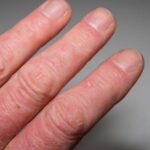Psoriasis is a chronic, immune-mediated inflammatory skin disease characterized by hyperproliferation of keratinocytes and systemic inflammation. It manifests through red, scaly, and often itchy plaques on the skin. This condition affects more than 125 million people worldwide and can significantly impair quality of life due to its physical, emotional, and social impact.

Pathophysiology of Psoriasis: Immune System Dysregulation
Psoriasis is primarily driven by T-cell mediated immune responses that mistakenly target healthy skin cells. The dysregulated immune activity accelerates the skin cell life cycle, leading to thickened epidermis and inflammation.
Triggers may include infections, stress, skin injury, certain medications, smoking, and environmental factors.
Clinical Manifestations: Recognizing Psoriasis Symptoms
Common symptoms include:
- Raised, red patches of skin covered with silvery-white scales
- Itching, burning, or soreness around plaques
- Dry, cracked skin that may bleed
- Thickened, pitted, or ridged nails
- Joint pain and swelling in psoriatic arthritis
Lesions are most frequently observed on the scalp, elbows, knees, lower back, and nails.
Classification of Psoriasis Types
Plaque Psoriasis (Psoriasis Vulgaris)
The most prevalent form, accounting for approximately 80–90% of cases. It features well-defined erythematous plaques with silvery scales.
Guttate Psoriasis
Characterized by numerous small, drop-shaped lesions often triggered by streptococcal infections. Common in children and young adults.
Inverse Psoriasis
Occurs in skin folds such as the armpits, groin, and under the breasts. Lesions are smooth, shiny, and red without scaling due to moisture.
Pustular Psoriasis
Marked by white pustules surrounded by inflamed skin. Can be localized (e.g., palms and soles) or generalized and life-threatening.
Erythrodermic Psoriasis
A rare but severe form involving widespread redness, scaling, and systemic symptoms. It requires immediate medical attention.
Psoriatic Arthritis
An inflammatory joint condition affecting up to 30% of individuals with psoriasis. Symptoms include joint stiffness, pain, swelling, and decreased range of motion.
Diagnostic Methods for Psoriasis
Diagnosis is primarily clinical, based on physical examination of the skin, nails, and scalp. In uncertain cases, a skin biopsy can confirm psoriatic histopathological features such as acanthosis, parakeratosis, and Munro microabscesses.
No specific blood test confirms psoriasis, but inflammatory markers (ESR, CRP) may be elevated in active disease. Imaging (X-ray, MRI) is essential in assessing psoriatic arthritis.
Psoriasis Triggers and Risk Factors
- Genetics: A strong familial component; HLA-Cw6 is the most associated gene
- Environmental Triggers: Infections, trauma (Koebner phenomenon), and weather changes
- Lifestyle Factors: Smoking, alcohol consumption, obesity
- Medications: Beta-blockers, lithium, antimalarials, and withdrawal from corticosteroids
- Stress: A recognized exacerbator of flares
Comprehensive Treatment Approaches for Psoriasis
Topical Therapies
- Corticosteroids: First-line for mild to moderate cases
- Vitamin D analogs (Calcipotriol): Slows keratinocyte proliferation
- Coal Tar, Salicylic Acid: Helps reduce scaling
- Topical Calcineurin Inhibitors: Especially effective in sensitive areas
Phototherapy
- UVB Narrowband Phototherapy: Reduces T-cell activity
- PUVA (Psoralen + UVA): For resistant or widespread disease
- Requires medical supervision due to long-term carcinogenic risk
Systemic Agents
- Methotrexate: Immunosuppressive; effective in moderate-to-severe cases
- Cyclosporine: Fast-acting but nephrotoxic with long-term use
- Acitretin: A systemic retinoid often used in pustular or erythrodermic forms
Biologic Therapies
Target specific immune pathways and have revolutionized treatment:
- TNF-α Inhibitors: Etanercept, Infliximab, Adalimumab
- IL-12/23 Inhibitors: Ustekinumab
- IL-17 Inhibitors: Secukinumab, Ixekizumab
- IL-23 Inhibitors: Guselkumab, Tildrakizumab, Risankizumab
These require screening for latent infections, especially tuberculosis.
Psoriasis and Comorbidities
Individuals with psoriasis are at increased risk for:
- Cardiovascular Disease
- Metabolic Syndrome and Diabetes
- Depression and Anxiety Disorders
- Inflammatory Bowel Disease (Crohn’s, Ulcerative Colitis)
- Non-alcoholic Fatty Liver Disease (NAFLD)
Regular screening and multidisciplinary care are recommended.
Lifestyle Modifications and Supportive Measures
- Diet: Anti-inflammatory diets (rich in omega-3, fruits, and vegetables)
- Exercise: Regular physical activity improves overall health and reduces flare severity
- Smoking Cessation and Alcohol Reduction: Essential for disease control
- Stress Management: Techniques such as mindfulness, yoga, and CBT can improve flare frequency
Psoriasis in Special Populations
Pediatric Psoriasis
Often presents as guttate or plaque type; treatment includes mild topical agents. Psychological support is crucial due to stigma.
Psoriasis in Pregnancy
Systemic treatments like methotrexate and acitretin are contraindicated. Biologics such as certolizumab pegol may be considered under specialist guidance.
Advances in Psoriasis Research and Future Therapies
Emerging therapies target newer pathways, such as TYK2 inhibitors and JAK inhibitors, offering promise in refractory cases. Personalized medicine, based on genetic and immune profiling, is anticipated to improve treatment specificity and outcomes.
Frequently Asked Questions:
Q1. Is psoriasis contagious?
No. Psoriasis is not an infectious condition and cannot be spread through physical contact.
Q2. Can psoriasis be cured?
There is no permanent cure, but long-term remission is achievable with appropriate therapy.
Q3. How is psoriasis different from eczema?
Psoriasis has thicker, well-demarcated plaques and often affects extensor surfaces, while eczema typically involves flexures with more itchiness.
Q4. What is the link between psoriasis and arthritis?
Psoriatic arthritis is an autoimmune joint condition associated with psoriasis, often affecting fingers, toes, and the spine.
Q5. Are biologics safe long-term?
Biologics have favorable safety profiles but require monitoring for infections and malignancy risks.
Psoriasis is a complex, chronic autoimmune condition with significant dermatological and systemic implications. Accurate diagnosis, individualized treatment, and comprehensive care, including attention to lifestyle factors and psychological wellbeing, are essential in achieving optimal disease control and enhancing the lives of those affected. Continued research holds promise for even more effective and tailored therapeutic options.

